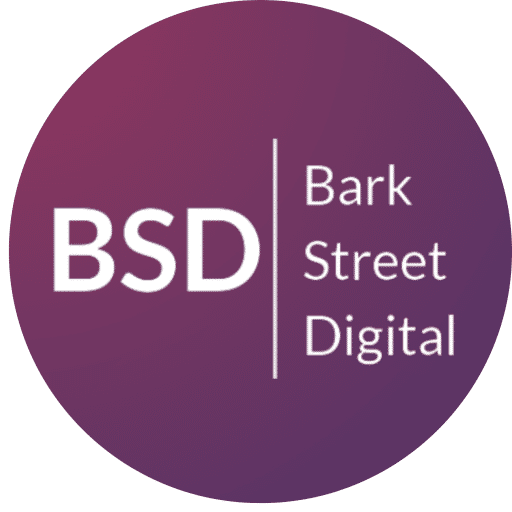LLM SEO – Optimising Content for AI Search
Find out how we can grow your business
Search has always been about connecting people with the right information. For years, that meant focusing on search engine optimisation, chasing keyword rankings, and building backlinks. But the way people look for answers online is shifting rapidly. Instead of just typing a few words into a search bar, many are now asking questions directly to AI tools such as ChatGPT, Claude, Gemini, or Perplexity.
LLM SEO, or Large Language Model SEO, is about making sure your content is easy for AI systems to find, understand, and recommend when generating answers. Unlike traditional search engines, which show a list of ranked results, language models try to give users a single, coherent response. That means your content doesn’t just need to rank well; it needs to be good enough to become part of the answer.
Bark Street Digital break down what LLM SEO is, why it matters, and how you can start adapting your SEO strategies for AI-driven search.

What is LLM SEO?
LLM SEO is the practice of tailoring your content so that large language models (LLMs) can easily interpret it and use it when responding to user queries. These models don’t crawl the web in quite the same way as Google, but they still rely on accessible, structured data and trustworthy information to generate answers.
With traditional SEO, the goal was visibility by appearing high on the search results page. With LLM SEO, the goal is inclusion, i.e. being one of the sources the AI turns to when it constructs its answer.
Put simply, if your content isn’t clear, authoritative, or useful, there’s a strong chance it will be ignored when AI-generated responses are created.
Why LLM SEO matters
AI-powered search isn’t some far-off trend; it’s already here. Microsoft’s Bing has integrated conversational AI, Google is experimenting with its Search Generative Experience, and millions of people are bypassing traditional search engines altogether in favour of AI platforms.
For businesses, publishers, and content creators, this shift matters because:
- Reduced visibility is a risk. If your content doesn’t show up in AI answers, potential customers may never discover you.
- Trust and authority are critical. AI systems don’t list dozens of results. They summarise, which means only a handful of sources influence the final response.
- Search habits are changing. People phrase questions differently with tools like ChatGPT, often in full sentences or conversational prompts which requires a different style of optimisation.
Adapting to these changes early means staying relevant while others scramble to catch up.
Key principles of LLM SEO
The good news is that LLM SEO doesn’t throw out everything you know about content or digital marketing. In fact, it reinforces the basics—clarity, authority, and usefulness. Here are some guiding principles:
1. Write in natural language
AI is trained on how people actually speak and write. That means overly complex, keyword-stuffed text won’t perform as well. Aim for clear, conversational writing that mirrors how someone might ask and answer a question in real life.
2. Anticipate user questions
When people interact with AI platforms, they tend to ask full questions like, “How do I fix a leaky tap?” or “What’s the best way to start a podcast?” Creating content that addresses these directly, through FAQ sections, how-to guides, and step-by-step explanations, makes it easier for AI to use your material.
3. Build authority and trust
AI models are more likely to include sources that appear credible. That means demonstrating expertise, citing reliable references, and making sure your site signals professionalism. Including author bios, credentials, and relevant brand mentions can all help establish credibility.
4. Structure content clearly
Readable formatting isn’t just for human users—it helps AI too. Break up text with headings, bullet points, and concise summaries. Think of your content as something both a person and an algorithm should be able to skim quickly.
5. Offer both brevity and depth
AIs often extract short snippets of information to provide quick answers. But that doesn’t mean long-form content has no place. The ideal strategy is to combine short, snappy explanations with deeper sections that explore the topic in full.
Practical strategies for optimising content for AI search
So how do you actually put AI SEO into practice? Here are some steps you can take:
Create content hubs
Instead of scattering disconnected blog posts across your site, build topic clusters or hubs that comprehensively cover a subject. For example, if you run a fitness website, you might create a hub on “Strength Training for Beginners” with related articles on nutrition, workout plans, and recovery tips.
This approach signals topical authority and helps large language models understand your expertise in that specific area.
Optimise for direct answers
Think about how Google’s featured snippets work—that’s often the style of content AIs pull from. Write concise answers to common questions at the top of sections, then expand with more detail below. This makes your content usable for both quick responses and deeper reading.
Use structured data
Adding schema markup to your site can give search engines and AI systems clearer context. Whether it’s marking up FAQs, reviews, or product details, structured data helps machines interpret your content accurately and may improve your chances of being included in AI-generated results.
Keep content fresh
AI-driven systems prefer up-to-date information. Regularly updating your articles with new stats, trends, and examples signals that your site is relevant and reliable. Evergreen guides are valuable, but don’t let them go stale.
Show real expertise
Where possible, include author details, practical examples, or case studies that prove you know what you’re talking about. AI is more likely to pull from sources that demonstrate lived experience and expertise rather than thin, generic writing.
How LLM SEO differs from traditional SEO
While there’s plenty of overlap, optimising for AI-driven search introduces some unique differences. Traditional SEO is often keyword-driven, focused on rankings and click-through rates. LLM SEO, on the other hand, is more about clarity, authority, and natural language.
Instead of asking, “How do I rank for this keyword?” the question becomes, “Would an AI find this content clear, trustworthy, and useful enough to include in its answer?”
This shift also means businesses may see fewer clicks if AI platforms provide the answer directly. That makes it even more important to provide value beyond the basics, something that encourages users to explore further once they’ve found you.
Challenges of LLM SEO
Like any new field, AI SEO comes with hurdles.
- Lack of transparency: It’s not always clear how large language models (LLMs) choose which sources to use, making optimisation partly experimental.
- Fewer opportunities for visibility: With traditional search, a site could still pick up traffic from being result number eight on the page. With AI-generated answers, there might only be space for two or three sources.
- Changing user behaviour: People may never visit your site if the AI answer satisfies their query. This means you’ll need to think about ways to entice users with deeper content, unique insights, or interactive tools they can’t get from a quick summary.
The future of LLM SEO
Looking ahead, it’s clear that AI-driven search is going to become more prominent, not less. We can expect:
- Greater integration of AI into mainstream search engines. Instead of being a side feature, AI-generated answers may become the default.
- Growth in conversational and voice search. People will rely on natural, spoken queries more than ever, often handled by tools like ChatGPT or voice assistants.
- Increased focus on trust signals. Verifiable expertise, transparency, and credibility will be critical in standing out.
- More demand for interactive and structured content. From calculators to comparison guides, AI will increasingly favour content that is easy to reuse and present clearly.
In short, the competition for visibility will intensify. But businesses that adapt early with effective SEO strategies will be in the strongest position to thrive.
How Bark Street Digital can assist
Adapting to the shift towards AI-driven search can feel overwhelming. Keeping up with algorithm changes was already a challenge, and now businesses are expected to understand how large language models work on top of traditional search engine optimization. That’s where Bark Street Digital can help.
Our team specialises in SEO strategies that combine the best of both worlds: traditional optimisation techniques and forward-thinking approaches to AI SEO. We focus on:
- Content creation and optimisation – writing in natural, conversational language that AI platforms can easily interpret while still appealing to human readers.
- Structured data implementation – ensuring your site is marked up correctly so that AI tools can pull accurate information.
- Brand visibility – helping you build trust signals and brand mentions across the web so that your business is more likely to be recognised as authoritative.
- Regular content audits – keeping your information up to date so that it remains relevant to both search engines and AI-generated responses.
- Strategic planning – creating long-term content strategies designed to future-proof your online visibility in an AI-driven search landscape.
We combine our expertise in digital marketing with a clear understanding of how large language models (LLMs) shape modern search to help your business remain visible, authoritative, and competitive as search continues to evolve.
Get in Touch
01204 236028
Open Hours
08:30 – 16:30
Monday- Friday
Our Office
4 Bark Street East
Bolton, BL1 2BQ
What we Do
SEO
Web design
Social media management
WordPress management
